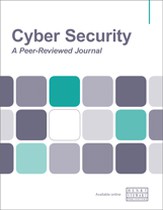Changing the rules of the game: How can law enforcement deter criminals by increasing the risks of conducting cybercrime?
Abstract
This paper provides an overview of the service-based underground industry that fuels cybercrime, turning it into a growth business in terms of scope and volume of attacks, number of victims and economic damage. It argues for a networked, intelligence-led, adaptive and proactive response, looking specifically at the role of law enforcement. Prioritised and coordinated joint actions against the key cyber threats supported by adequate legislation can change the rules of the game by increasing the risks for cybercriminals and imposing real consequences. Effective prevention and disruption activities can further tip the scales to the detriment of criminals. The multistakeholder model used by Europol’s European Cybercrime Centre is presented as an example of how this can be put in practice, including some examples of international operations that leverage the power of the network.
The full article is available to subscribers to the journal.
Author's Biography
Philipp Amann is Head of Strategy of Europol’s European Cybercrime Centre (EC3). He manages the business area responsible for the delivery of a number of strategic, situational and tactical products, including EC3’s flagship annual strategic product, the Internet Organised Crime Threat Assessment report. He also oversees several other key functions such as prevention and awareness, stakeholder management and training. In his role, Philipp is responsible for the development of strategic concepts at EU level and liaises with different stakeholder groups. Prior to joining EC3, he held positions with various international organisations such as the Organisation for the Prohibition of Chemical Weapons, the International Criminal Court and the Organization for Security and Co-operation in Europe. Philipp has worked in various fields, including the financial sector, global disarmament and arms control, law enforcement and international law. He has published on various different topics and holds degrees from the University of Vienna and University College Dublin.
Aglika Klayn has been working for the European Cybercrime Centre (EC3) at Europol for more than four years. During this time, she has been involved in the implementation of the centre, its multi-annual strategic planning, performance management and business intelligence gathering. She is also responsible for the reporting of EC3’s operational activities. Furthermore, Aglika is the coordinator for the Joint Cybercrime Action Taskforce (J-CAT) hosted at Europol and acts as the EU Contact Point for cybercrime policy and legislation matters. In addition, Aglika provides advice to senior management and other EU institutions on the basis of tactical analysis. Before joining EC3, Aglika worked in the Vienna Diplomatic community and at INTERPOL, Lyon, dealing with a wide range of international security matters. Aglika holds a doublemajor Bachelor degree in European Studies and Journalism and Mass Communication from the American University in Bulgaria in Blagoevgrad, as well as an advanced Master degree in International Security with specialisation in asymmetric transnational security threats from the University of Warwick, UK.
Grégory Mounier joined the Office of the Director of Europol as a policy advisor in 2008 to deal with Europol’s external relations. In 2010 he joined the External and Strategic Affairs Unit as a Team Leader, where he was in charge of devising and implementing Europol’s strategic relations with the USA and the European Parliament. Over the last five years Grégory also advised the Director on cybercrime and terrorism policies. In 2015, he was appointed Head of the Outreach and Support team at the European Cybercrime Centre (EC3). He is responsible for EC3’s strategic engagement with the private sector. Grégory also leads Europol’s policy engagement on Internet Governance, representing Europol at the ICANN GAC Public and Safety Working Group (PSWG).
